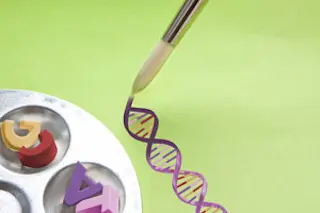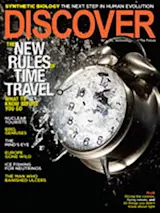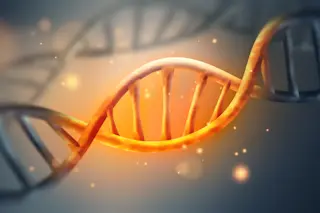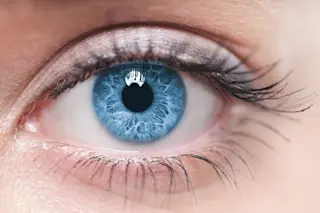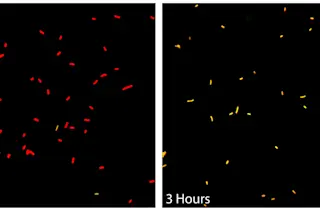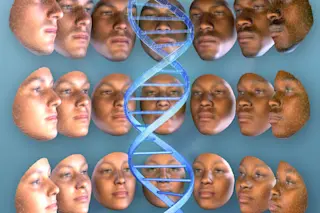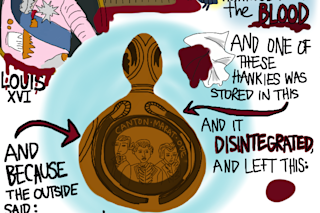Here is how to get an appointment with George M. Church, professor of genetics at Harvard Medical School, director of four organizations devoted to genomics, cofounder of four biotech firms within the past four years, scientific adviser to 17 ultralow-cost genome sequencing companies, and founder of the Personal Genome Project:
First, you send him an e-mail requesting a meeting. He will reply with the URL for a Web site that lists his current schedule. This, when printed out, proves to be a 10-page, single-spaced document in very small type that starts with “January 1, 2009: Holiday, New Year’s Day” and ends with “September 17, 2010: International Steven Hoogendijk Award 2010 for G. Church, Rotterdam, Netherlands.” Searching through hundreds of entries—as many as nine falling on a single day—you try to find an uncommitted hour. If successful, you contact either of Church’s two administrative assistants to propose a date, time, and place. Then you hope for the best.
When the magical day arrives, the first question I ask Church is how he can possibly direct, create, advise, and mastermind so many projects (as well as teach classes and supervise Ph.D. dissertations) without going crazy. “Well, I think it’s an assumption that I’m not crazy,” he says. “They all seem pretty much the same to me. They’re all integrated, and I guess what we try to do is—we try to do integration.”
If Church’s career has a single integrating theme, it is finding ways to apply the machinery of automation to the molecular basis of life, the genome. His infatuation with computers goes back to grammar school in Clearwater, Florida, when, at age 9, he built an electronic computer for a science fair. Genetics entered the picture in the spring of 1974. Then an undergraduate at Duke, Church typed into a computer all the transfer RNA sequences that were available at the time and folded each one into a three-dimensional structure, as RNA molecules were known to do. “I became obsessed with sequencing,” he says. The obsession never faded. Today his myriad projects all emerge from his impulse to know, unravel, depict, use, and—better yet—tinker with and even create the RNA and DNA codes that constitute the software of living systems.
That ambition has resulted in a raft of Church-inspired technological innovations. His automated genome-sequencing machine is driving the price of mapping a person’s entire genetic code down toward $1,000, almost unbelievably cheap considering that, less than a decade ago, the government-funded Human Genome Project spent roughly $3 billion to sequence a single genome. Low-cost sequencing has allowed Church to embark on a second venture, the Personal Genome Project (PGP), which aims to sequence the genomes of 100,000 volunteers for free. The project would provide the first extensive genome database that matches DNA to a wide range of traits—not merely physical attributes like height or eye color but also disease histories and personalities. The idea is to help inaugurate the field of personalized medicine, in which each individual would receive preventions and treatments tailored to his or her specific genetic makeup, along with predictions of future health issues.
The third major item on the Church agenda is to develop the ability to rewrite life’s software, giving us the power to reprogram organisms to do things that are radically different from what they do normally. Such wholesale reprogramming would be prohibitively expensive with what he calls the “laborious and outdated” techniques of conventional genetic engineering, which make one alteration at a time to the DNA of organisms. Church therefore went out and invented new techniques. His latest creation is a set of tools and methods that he calls multiplex automated genome engineering, or MAGE. It introduces many modifications to a genome simultaneously, opening up the possibility of designing novel genomes—in essence, creating new forms of life. One of Church’s most promising projects is to engineer bacteria that can produce jet fuel or gasoline from wood pulp or cornstalks. Another would tweak the DNA of microorganisms so that they metabolize carbon dioxide, turning it into a beneficial substance.
That is only the beginning of what MAGE could do. Ultimately Church’s tools of synthetic genomics could lead to significant, even portentous, changes to plant, animal, or human genomes. They could turn back the clock of evolution: Church has proposed a way of altering the elephant genome until it is identical to a woolly mammoth’s, or turning a human’s DNA into a Neanderthal’s. These tools could also be used to make people resistant to viruses, lengthen life span, and increase human intelligence. They could advance evolution—our evolution—to places it has never gone before.
George Church is a large specimen of a man, with a full beard and somewhat untamed hair. Now in his mid-fifties, he is rather easy to get to know because of his “Unauthorized Autobiography and Infrequently Asked Questions,” which appears on his Harvard-hosted Web site. Here you will find, among other things, his online medical records, dietary notes, baby picture, signature, and random interests (which include waterskiing, rock climbing, and turtle breeding), as well as the exact latitude and longitude of his home and a map of his neighborhood.
For a man of such unusual talents and attainments, Church had a relatively conventional life until he entered college. He graduated magna cum laude from Duke University in two years, then proceeded to flunk out of graduate school. The reason, he says, is that he neglected “boring” course work in favor of lab research, which resulted in five papers published in peer-reviewed journals. That got him accepted to a doctoral program at Harvard, where he studied with molecular biologist Walter Gilbert. In 1980 Gilbert won a Nobel Prize for his work sequencing DNA.
Church thrived in Gilbert’s lab. In 1977 he developed a way of automating a key step of Gilbert’s DNA sequencing method. DNA strands are made up of combinations of four bases, molecules that are denoted by the letters A, T, C, and G. Sequencing DNA—reading out all the letters along the double helix—was a laborious process in which lab technicians used pipettes to deposit DNA samples onto the surface of a gel. The samples were labeled with radioactive isotopes, which meant that each individual base (the A, T, C, or G) produced a visual signature on film. It was up to the experimenter to read and record the sequences in the proper order. Church, who always wants to do things quickly, preferably by automation, figured out how to make a computer read the sequences. He did not yet have his Ph.D., but he was already making a major contribution to genetics.
He kept going. During the early 1980s he decided that he could speed the process further by “multiplexing” the DNA strands, sequencing small segments of them simultaneously. In the sort of lightning-bolt realization that often heralds a breakthrough, Church saw an analogy between biochemistry and electronic communications. Engineers can transmit many messages at once through an optical fiber by tagging each one with a number and sorting things out at the receiving end. In the same way, Church figured out how to break a long strand of DNA into pieces and tag each piece with an enzyme. That way, he could sequence all the pieces at once, getting the job done quickly, and reassemble the original DNA at the end.
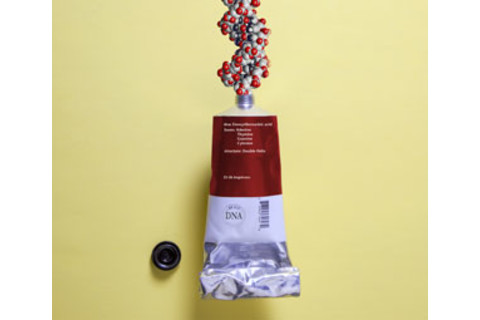
Illustrations by Ann Elliot Cutting | NULL
It was another groundbreaking achievement, and it made Church a leading figure in genomics research. In 1984, when scientists began to get serious about starting the Human Genome Project, Church was the only scientist who attended all three of the early meetings that laid the project’s foundation. “George has been perhaps the most creative single scientist in pioneering next-generation DNA sequencing,” says Leroy Hood, founder of the Institute for Systems Biology in Seattle.
Despite these advances, DNA sequencing remained so slow and expensive that the notion of decoding even a single human genome seemed monumentally difficult. In 1994 the Genome Therapeutics Corp., one of three sequencing centers that Church helped establish, produced the first genome sequence sold commercially: The company decoded the DNA of Helicobacter pylori, the bacterium that causes peptic ulcers. The Swedish drug company Astra AB, which wanted to use the DNA sequence to design new antimicrobial agents, bought the rights to that single genome for $22 million. At that price, sequencing was hardly ready for the masses.
One reason sequencing was slow was that it was difficult to identify all the individual nucleotides, or structural components, within a single DNA molecule. Doing so reliably required making millions of copies of the same DNA strand by cloning it in a bacterium, sort of like printing out many versions of a document and then comparing them all to make sure there are no typos.
The technique for making copies was the polymerase chain reaction (PCR), which was used to replicate DNA for genetic studies or forensic analysis. At the time, PCR was normally done by lab bench–size machines using a complicated process. First the DNA molecules were heated to break them apart into their two separate strands. Then DNA polymerase, an enzyme, was added to make copies that were complementary to each of the original DNA strands. Finally the whole process was repeated several times. In 1999 Church and a graduate student at MIT, Robi Mitra, developed a streamlined version of this technique. Using clever chemistry, they performed millions of PCR operations simultaneously on a single glass microscope slide. The end result were “polonies,” entire colonies of DNA molecules that had been amplified via PCR.
This was the breakthrough that led Church to create the Polonator, a high-speed, relatively inexpensive automated sequencer. (The name of its latest incarnation, the Polonator G007, is a reference not only to James Bond but also to the year of its release, 2007.) The Polonator was a landmark machine both for its low cost—$170,000, one-third the cost of anything else on the market—and for the fact that the machine is fully open to the user, who may reconfigure it at will. “Usually manufacturers make all these threats about voiding warranties, intellectual property, this and that,” Church says, “whereas we actually want people to feel that they are enabled to improve the machine if they want to. Users can change the software, the hardware, the chemicals.”
The Polonator became one of the basic technologies behind Church’s Personal Genome Project, unveiled in October 2008. Initially the idea had been that every person would want to have his or her genome sequenced, if only for predictive reasons. Medical analysis of your genome could tell you what diseases you were genetically predisposed to; in some cases that knowledge would be actionable, meaning that you could take steps against contracting those diseases. For instance, if you knew as a teenager that you were genetically disposed to adult-onset diabetes, you might alter your dietary regimen many years beforehand. “We already have 1,530 highly actionable, highly predictive genetic associations,” Church says. (You can review them on the Web at genetests.org.) Later, another rationale emerged for having one’s genome sequenced: personalized medicine. The idea is that your doctor would be able to browse your genome in the examining room and select treatments, medications, and preventive strategies suited to your individual biology.
Soon Church had another far-reaching thought. Why not assemble a wide database of personal genomes and genes that were correlated with people’s traits? Other people with the same genetic quirks could use those correlations to make smarter life choices. If, say, talented musicians tended to have the same set of genes, and if your child happened to have those genes too, music lessons might be a good idea. In addition to sequencing DNA, Church decided to ask participants about their life experiences and add that information to the database. “We shouldn’t let genetics be destiny,” he says. “But if your genome tells you, ‘Hey, here’s a hit; you might be really good at this thing,’ it might encourage you to try really hard on something that you otherwise would have missed.”
The fly in the ointment, Church thought, was that in order for the information to be useful, all of it would have to be publicly available. That meant test subjects would have to expose everything—their genes and traits, their strengths, foibles, and personal idiosyncrasies—on the Web for all to see. Revealing this information would make it impossible to keep the identities of the participants secret. Church worried about how he could preserve their privacy. The solution to this conundrum, he says, “struck me like cutting the Gordian knot.” His idea: Recruit people who, like Church himself, were not shy about divulging details of their lives. “Instead of falsely promising privacy, which was where we were headed, let’s promise them that their data won’t be kept private and make sure they know what they’re getting into.” Participants would have to read and sign a consent form and, to make sure they had understood it, would be required to pass an online test.
The first 10 volunteers of the Personal Genome Project, known as the PGP-10, included Church himself, technology oracle Esther Dyson, and Harvard psychologist Steven Pinker. All of the volunteers’ personal information—vital signs, allergies, medications, medical history, ethnicity, ancestry, traits, facial photographs, and yes, their genomic data sets—can be viewed, downloaded, and used without restriction at personalgenomes.org.
The Personal Genome Project was officially cleared to expand beyond the original 10 participants on DNA Day—April 25, 2009, the 56th anniversary of Watson and Crick’s letter to the journal Nature on the double-helix structure of DNA. Any U.S. resident who is 21 or older and is willing to share genetic, medical, and life experience information may apply. If you are accepted, your genome will be sequenced for free. Financing has come in part from Google and other corporate sponsors, as well as from Church and various private donors. “In 10 years the personal genome could be one of the most important data sets for each individual patient,” Hood says.
Before the Personal Genome Project had gotten off the ground, Church was already off and running on the next big thing. Beyond his corner office in Harvard Medical School’s New Research Building, with its floor-to-ceiling windows and imperial view down the Avenue Louis Pasteur, Church and his colleagues were busily developing MAGE, his shotgun approach to genetic modification.
The idea behind MAGE is to use the same kind of multiplexing technique that Church developed for sequencing (that is, breaking up a genome and tagging its constituent parts with enzymes) but then to add additional steps to insert, delete, and substitute passages of DNA. Instead of just copying existing sequences of DNA, MAGE could write new ones.
Church and his colleagues demonstrated the technique, in work published in Nature last July, by modifying the common bacterium E. coli to produce lycopene, an antioxidant found in tomatoes, watermelons, and red peppers. Scientists had previously used conventional genetic engineering techniques on E. coli to make it produce insulin and other substances, but they had typically targeted only one gene at a time. MAGE allowed Church to simultaneously target 24 genes, each playing a role in the production of lycopene.
Church started by producing thousands of variations of the target genes, concentrating on those passages of DNA that regulate how the genes interact with ribosomes, the parts of the cell that take information from the genes and use it to make proteins. With MAGE, he inserted these variations into the genomes of a large batch of E. coli cells. He began by using an electric current to open holes in the bacteria’s cell walls. Then he sent the new gene variants into the cell, where the bacteria’s own machinery for self-assembling DNA took over and incorporated the genes into the genome. In 24 hours Church was able to produce 4 billion different E. coli genomes. From there it was a relatively simple matter to select the variants that produced lycopene most prolifically.
This proof-of-concept experiment opens up staggering possibilities. Soon it may be possible to produce entire novel genomes or to make numerous changes in existing ones. In the lycopene experiment, Church did not know which modifications to make in the E. coli genes to get the result he wanted, but the technique could just as easily be used to introduce specific sets of changes into a genome, inserting and deleting hundreds or thousands of genes at once. This capability would allow scientists to give an organism’s DNA an extreme makeover, rather than just tinker with it.
A genetic sculptor could then alter physical traits or disease vulnerabilities that are not assigned to merely one or two stretches of DNA. For instance, a common lab mouse lives 2.5 years, on average, but a naked mole rat lives 25. That difference in life span might be governed by thousands of genomic variations, but soon we could have access to all of them. Once researchers identify the genes that contribute to the naked mole rat’s longevity, they could make analogous changes in the genome of human adult stem cells. Over the generations, it should be possible to progressively increase the human life span.
Church thinks MAGE may also open the door to the ultimate antiviral strategy. In order to replicate and do their damage, viruses hijack the genetic machinery of their host organisms. To thwart the invaders, you could make certain alterations in the genetic code of the host’s cells. If you could figure out which modifications work, and if you could also find some gene-therapy technique for delivering those changes to the host cells, you could in principle make a person (or livestock, or any other creature) inherently resistant not to just one virus but to all viruses, even those that have not been discovered.
MAGE could also be used to reverse-engineer the genome of a species, transforming it into the genome of another. On February 12, 2009 (the 200th anniversary of Charles Darwin’s birth), paleogeneticist Svante Pääbo of the Max Planck Institute for Evolutionary Anthropology in Germany announced that he and a team of researchers had sequenced about 63 percent of the Neanderthal genome. Afterward, Church told The New York Times that “a Neanderthal could be brought to life with present technology for about $30 million.”
Church would start by breaking up the human genome into 30,000 or so separate chunks, each about 100,000 base pairs long. Once Pääbo’s team had fully sequenced the Neanderthal genome, Church would use a computer to compare that genome, chunk by chunk, to the modern human genome to see where and how the two differed. Where the Neanderthal had gene variants for a larger skull, for instance, Church would use MAGE to modify the nucleotide sequences that constituted those genes in one or more of the chunks of human DNA. He would keep doing the same with the genes underlying every trait that made Neanderthals different from humans. Finally, he would put all the separate, reworked genetic chunks back into a human stem cell. Each would find its own way, via the cell’s natural ability to assemble DNA, to the proper location. The result would be a freshly minted Neanderthal genome in a living cell. From there, creating a living, breathing Neanderthal would merely require implanting the cell into the uterus of a chimpanzee, or perhaps into an adventurous human female.
The implications are so mind-blowing that I have to ask, “You don’t see anything sacrilegious about this?”
“I wouldn’t say sacrilegious,” Church responds. “Humans have been manipulating humans in many ways for many years.”
Despite juggling all of these projects, Church does not feel rushed. On the contrary, he feels that he has had a great deal of time to think through the implications of his work. “I’d like to see us have basic enabling technologies that improve our quality of life, so we can safely analyze and engineer biological systems, make biofuels, and have personalized medicine. And have deeper self-knowledge,” he says.
Resurrecting a Neanderthal strikes Church as a constructive project, not a lark. “You could argue that it would give us an inkling into an alien intelligence possibly greater than our own, one that could save our species someday or keep us out of intellectual ruts,” he says. “Or Neanderthals might be resistant to some key diseases like AIDS, smallpox, tuberculosis, or the next pandemic. You might even be able to converse with them at length.”
The Neanderthal, though, would first have to contact one of Church’s two secretaries.


